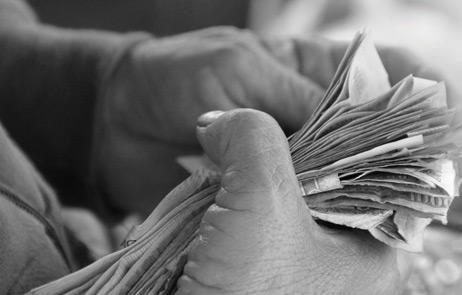Each year 10% of African GDP is lost to corruption. Globally, it is thought to be 5% of GDP which is affected. Clearly it is higher in Africa than elsewhere but why do they get such a bad name when it is evident worldwide. Let’s think about North America. According to the BBC, it is easier to set up an unchecked company in the US to hide your money, your identity and your beneficial status as a company owner than in Somalia! Bernie Sanders said in his election campaign that Wall Street often own political campaigns because they pay money to support their preferred candidate’s campaign and thus help sway the outcome of an election. If that happened in Africa it would be called corruption but in the US it goes by a different name and is swept under the carpet. James Comey’s autobiography makes it clear that the majority of cases being investigated daily by the FBI are cases of fraud.
Corruption wasn’t always part of African culture. As little time ago as the 1970’s it was quite unusual. But once it started, it quickly took hold as the norm. People accept it, they pay and so it’s self-perpetuating. Corruption is actually most common in the business sector – mis-invoicing and fake contracts to name just a couple of methods. But many people who take part in corruption actually don’t realising they are doing so, it’s just how things get done. Indeed, where is the line between tips, gifts, commissions and bribes? A business wins a contract from another business, they give a gift as a thank you. Isn’t that the same thing but dressed up with a different name? The business knows that if they place repeat business with that company, they are likely to benefit. The above example is an important one because many politicians in Africa come to office via the private sector. Businesses collaborate to help fund and push their preferred candidate forward in to government and because bribery is commonplace in Africa’s business culture, the architecture of corruption transfers into government and is maintained.
Some African countries are conquering corruption.
So, how are they doing it?
President Magufuli of Tanzania is an interesting case. He has not come from the business sector and is clear on his goal to tackle corruption in Tanzania. So far, he has had much support for the punishments he has imposed on anyone caught in corruption. But those aware of their guilt and with no desire to change will continually attempt to bring him down. Ultimately, he will leave office whether through attack, age or a change in voting and his reforms will not be sustainable. So, as much as popular opinion states that change must come from the top, and of course that must happen, I don’t believe it will be the most successful driving force.
In the country of Lethoso, a corrupt person is called “Sebolu” in Swahili meaning “spoilt thing”. A person or family caught participating in corruption of any sort are ostracised, you can’t go to church, your children are teased at school or even cast out from attending. The social stigma attached to being a corrupt person is so awful that society is self-governing against corruption and as a result Lethoso, alongside the likes of Botswana, are highly effective in tackling corruption and are amongst the least corrupt places in the world.
Kenya’s rating for corruption on the Transparency International index is unfortunately still rather high. People are still quick to pay a bribe.


